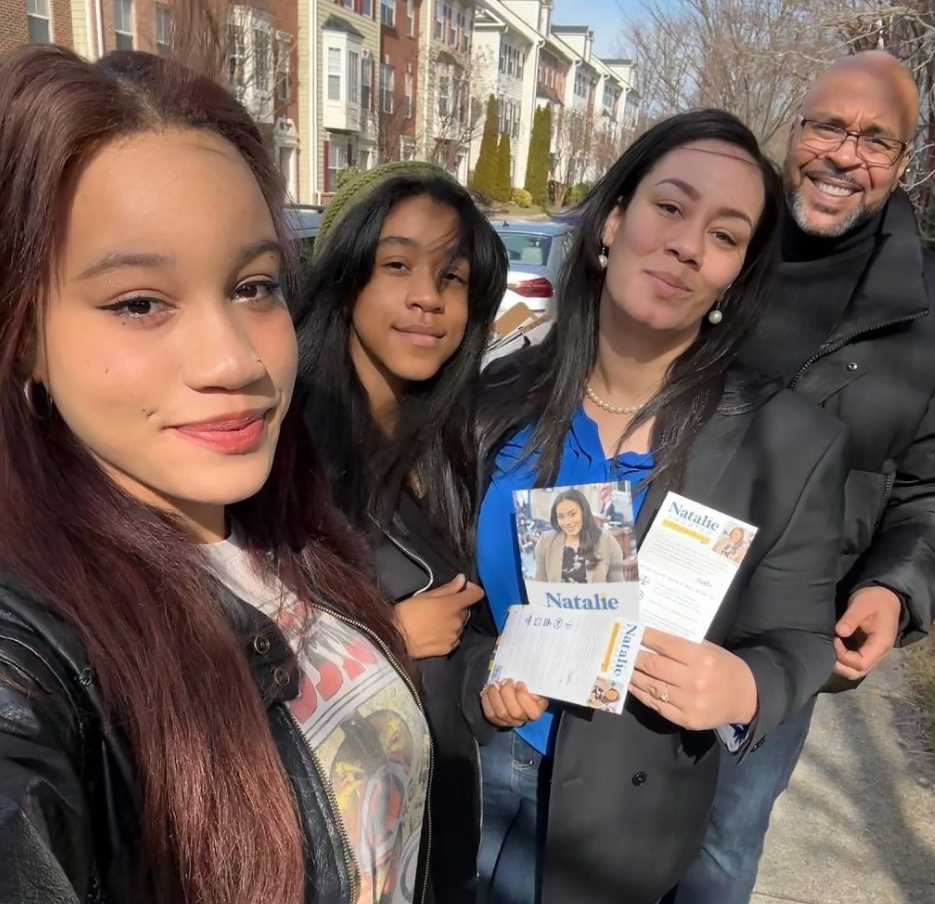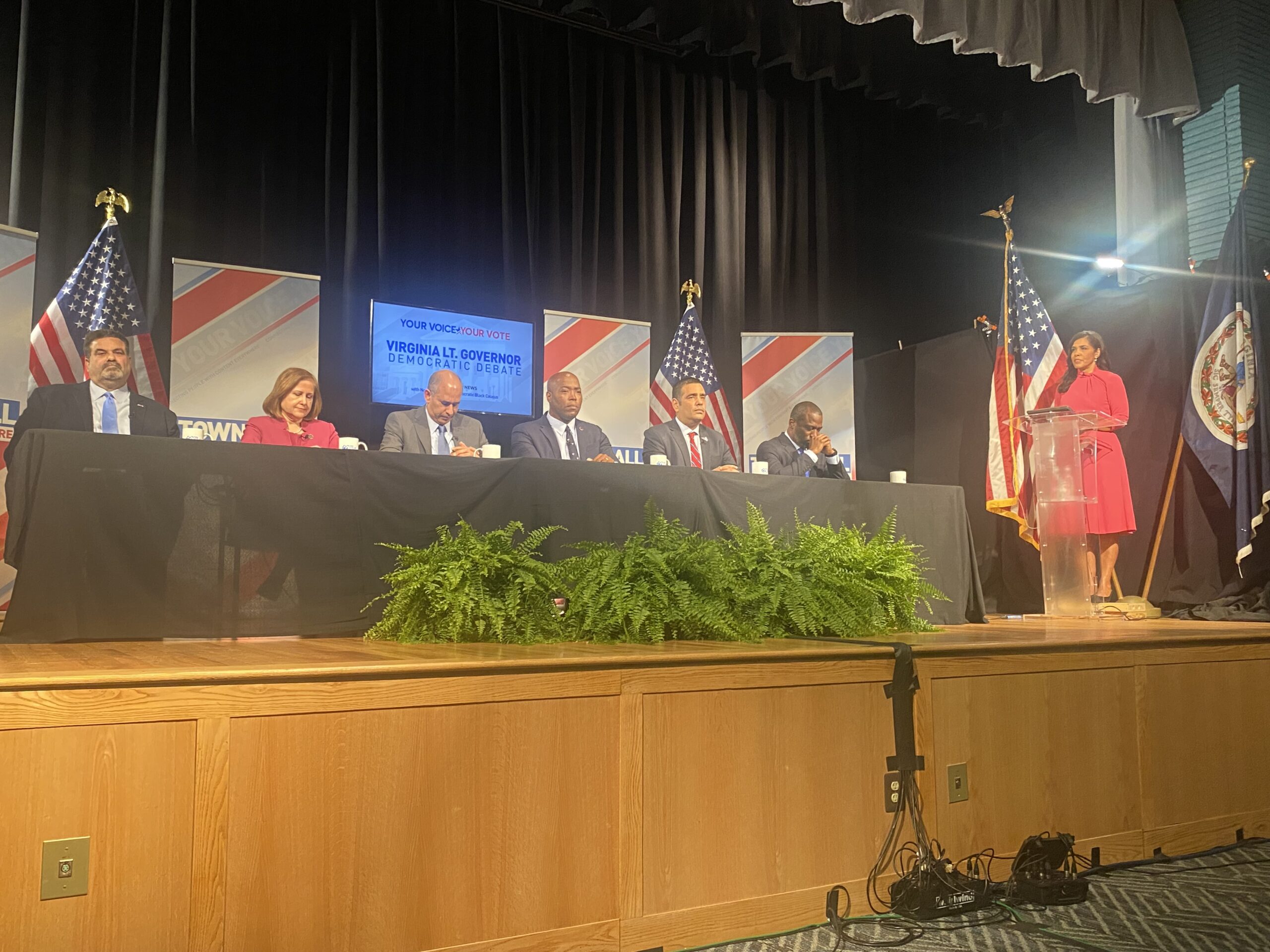Natalie Shorter talks legacy, service, and life as a candidate
In the latest installment of ‘Behind the Polls,’ Natalie Shorter reveals how she is preparing to run in the 19th House District delegate race.
John Di Lemme was famous for quoting: “Your family legacy is determined by the actions you take today.”
In a family known for their service in many arenas, Natalie Shorter now plans to continue the Lucas legacy of public service as she runs for delegate in the newly formed 19th House District. Recently, she met with the PW Perspective to discuss what led her to the decision to enter the race.
“It took a lot of thought to even say, ‘Yes I’m going to do this,’ simply because it takes a lot to run for office,” she said. “This is my first time being on the candidate side.”
As the granddaughter of Virginia Senator L. Louise Lucas, she understands the spectrum of what that entails. “Growing up in a political family, it’s very different. Not only that, but I also grew up in a family of public servants, like my father and brother. Growing up around all of that, it means a lot to carry on the legacy of service, because that’s what I want to do.”
“I was asked last year to run,” she continues, “but it took time for me to say yes, because I know what it takes to do put yourself out there. I had a decision to make towards the end of the year which brough time to my yes. There was a reason why, and it is why I’m such an advocate for women’s reproductive rights and freedoms.”
“My husband and I have had two ectopic pregnancies, and I had the second one on New Year’s Eve of all days. After that situation, I woke up the next day and told my husband (Byron) that I’m doing this. We found ourselves like millions of couples across the country, losing both of my tubes, we’d have to rely on IVF or surrogacy to have another child.”
She recognizes the urgency of winning the race in light of the proposed changes to reproductive freedoms. “These far-right extremists are trying to come for that, too.”
Dealing with tragedy is sadly something Natalie has experienced throughout her life. In addition to her own loss. Through it all, she has endured to enter this race by making the tough decisions.
“I had to quit my job,” she says, “that’s a decision a lot of women face because they’re choosing between career and family.”
” I looked at it in the face; I could stay at this Fortune 500 company and represent these five executives, or take my time, talents, treasures and resources, and impact 87,000 lives for the better. It means the world to me because there was a lot of loss that brought me to this decision.”
One of the issues that she is focusing on is reducing the maternal mortality rates, particularly among expectant Black mothers. What does she believe can be done?
“Sensitivity training would absolutely help improve bedside manner, and just listening to your patient,” she says. “This stigma that Black women can endure more pain is still the common practice. It takes me back to thinking about that the choice is being taken away when you’re dealing with a certain amount of pain and the doctor doesn’t believe you.”
How can that be resolved?
“We need more physicians of color, particularly women,” she responds, “when you’re dealing with gynecological issues and comfortability. There needs to be more discussions and action with these issues. You have people making decisions based on what they think, and not on reality.”
Speaking on protections, Natalie is also a strong advocate for common sense gun safety legislation. In light of another horrific tragedy in Nashville, and in the county, she proposes legislation that promotes safety. “I believe the best way is safe storage for weapons. It’s this narrative that we’re coming for them, but it’s not true. No civilian should have a high-capacity magazines. If you want that, sign up, join the military.”
She continues, “You have more training for a worker at Cava than you do for someone that’s going to purchase a gun, so we need more education before you purchase a weapon. Everyone needs to come to the table and figure this out. Not just in our streets but in our schools.”
Dealing with the rising absences of students in schools is another plan of her vision for the district. “Having school age children, my girls often say they don’t feel heard. Include kids in the conversation, ask them what makes them feel safe,” she says, noting how more parents, particularly of color, are taking their children out of public schools.
“The Governor [Youngkin] wants to rally around parents’ rights as if he invented the term. We need to have a student-led town hall into the 19th District,” she says, “and surveys given to parents across the commonwealth during the summer. It feels like the students are being blamed, but how can you blame a child? It’s society as a whole, and we need to be more inclusive of their value that they have a stake in their own future, they will be more involved. We need to consider their feelings.”
“A lot of our lawmakers don’t have school-age children, so how can they make policy based on what they think when they don’t have a student that’s in the school system,” she asks. “Let’s re-imagine education.”
Re-imagining education involves teaching Virginia history and social science in its entirety, which the current administration is proposing to curb. “There’s no way that type of thinking is going to move us forward,” she responds.
Due to redistricting, the new 19th District involves a marriage between the rural and urban landscapes of Prince William and Fairfax counties. What is the best way to approach this delicate balance?
“By coming together,” she says. “All community leaders, local officials, and even state elected leaders need to have the tough conversations. If something is working in one county, let’s see if it can work in the other county.”
As she steps into the political arena, she talks about how she finds balance to be prepared. “Early in the morning, I have a lot of things on my mind, but I have to take that time to center myself. Write them down and organize it in a way that works for me. It allows me to focus on my race.”
Does she feel the weight of expectations walking in the Lucas heritage of public service?
“It’s nothing new for me, but I don’t feel it as a weight, but to say so would indicate that it’s a burden,” she responds. “I see it as a privilege, and the privilege that I do have as a Black woman, I have to use it to help other people. It fires me up to get up everyday.”
The former businesswoman reflects on what it means to take this next step. “Not everyone can walk away from their job to run for office, it’s a blessing to do that. It’s a blessing to have a grandmother (L. Louise Lucas) to run for Portsmouth City Council in 1984. She’s been in public office my entire life.”
“My dad served in the Army and met my mom in Germany. My mom would knock on doors for the NAACP or the City of Portsmouth Democratic Committee; all of these organizations.”
How it gives her an unique advantage going into the race. “I don’t think like that because it’s all I know. All I know is seeing my family being involved, whether it is in public office, military or the police department.”
What is life like on the campaign trail?

“People will open the door and they’ll say, ‘You’re Natalie Shorter [laughs]! They know my face and know who I am. It means the volunteers are doing a great job. One person said they looked me up on the internet. She said that she had not voted in the last two election cycles but told me ‘I’m going to vote for you.” I felt honored, because I’m going one voter at a time. They’re telling you that they trust you, and you cannot betray that trust. You have to do everything to make your future constituents proud.”
“I remember one woman telling me, ‘I thought you were stuck up, and that surprised me. My family is just like everyone else, we play spades and eat crabs!”
Natalie understands the importance of running in these times and reflects on Black leaders such as Fannie Lou Hamer.
“The time is always right to do right,” she says. “For Fannie Lou Hamer to have a hysterectomy without her consent, it wasn’t that long ago that my grandmother was alive when she saw these things. My lived experience is not what people expect; a lot of people would ask about my experiences with gun violence.”
Yet even as she has established her own vision as a candidate, she still hears the comments.
“I guess there’s a framing of where people are putting me in this box of being a nepo baby, or establishment privilege? First off, I’m 5’11, so I don’t fit into anyone’s box [laughs]. Two, I lost my cousin to gun violence when I was nine. He was gunned down on the steps in Chesapeake. We were all very close. My friend Ebony was taken when I was 13. She opened the door and took two bullets to her chest and face. We were both in the seventh grade. I don’t know how many nepo babies experience something like that.”
“Hearing my dad taking threats because he was one of the few Black sheriffs,” she continues, “but there were many officers who would not go into Portsmouth’s communities without him. Which is another problem why officers need to live in the communities that they serve.”
Serving the community is something she has always done, and now being able to do that as a candidate gives her an opportunity to do it on a greater scale.
“I love to knock on doors talking with people, and it’s huge to experience that and change my district one voter at a time.”
Going into the race, she recognizes the Black representation of not just herself, but her respected opponents Makya Little and Rozia Henson. “In this race, there are three of us. We are all Black, we are all Democrats, and we are in this together. We have more in common than what sets us apart, but I am the only candidate from day one that brings not just lived experience, but the professional experience, and the legislative experience. I will bring the biggest types of influence to benefit the district. What people call campaign promises, I call standards, and I am fighting for their children, because it’s about our future.”
To find out more about her campaign, visit her website. Early voting begins on May 5 in all primary races.



